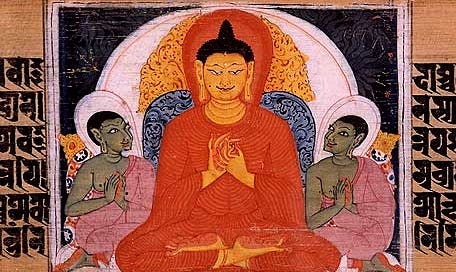Now this, monks, is the noble truth of dukkha: Birth is dukkha, aging is dukkha, death is dukkha; sorrow, lamentation, pain, distress, & despair are dukkha; association with the unbeloved is dukkha, separation from the loved is dukkha, not getting what is wanted is dukkha. In short, the five clinging-aggregates are dukkha.1
The first observation of the Buddhist worldview is the existence and universality of dukkha. From birth to death, all human life is affected by this suffering, frustration and dissatisfaction. As the Preacher of Ecclesiastes says: “Vanity of vanities, all is vanity (Ec 1:2).”
There is in Buddhism this awareness that the world is not as it should be, or as we would like it to be. Dukkha is a problem. Dukkha is what's wrong. Man's desire is to escape from, or put an end to, the experience of dukkha. This observation of dukkha ties in with the biblical truth that the world we inhabit is fallen. We’re surrounded by suffering, frustration, dissatisfaction, and things do not work the way they should. It's not that this problem affects certain aspects of life or the world, but this corruption is universal.
The Bible explains that this dukkha is the consequence of the separation between God and man due to the Fall. Human beings along with the whole world suffer from the absence of God. In this way the Bible offers a more profound explanation of the problem of dukkha than Buddhist sources. When Peter Harvey asks, “Is Buddhism ‘pessimistic’ in emphasizing the unpleasant aspects of life?”,2 the Bible's answer is both “yes” and “no.” On the one hand, no, the Buddhist concept of dukkha is not even pessimistic enough because Buddhism underestimates dukkha. Buddhism does not see the roots of dukkha in sin, and therefore the proposed solution is inadequate. On the other hand, yes, the Buddhist concept of dukkha is too pessimistic because it denies the existence of the God who is outside the universe, and who is not affected by dukkha.
The difference in the starting point changes everything. Buddhism's first truth is the existence of dukkha, but the Bible starts with the good God and his good creation. Dukkha doesn't appear until Genesis 3, and when it does, it’s as an intruder, a foreign element in God’s creation. Thus, the Bible explains that dukkha, although it is the experience of every human being, is not natural. Buddhism, on the other hand, does not make dukkha an unnatural reality, since it has been part of the warp and woof of the universe since eternity past.3
Justice, personal and impersonal
In Buddhism, we speak of dukkha, not sin. This language reflects the fact that there is no Supreme Judge in the Buddhist worldview, and that the consequences for human actions, whether bad or good, are mechanical and impersonal. “Karmic results are seen simply as natural results, arising from a kind of law of nature.”4
This view can be attractive, as it avoids the unpleasant image of an avenging God, as well as certain difficulties such as the problem of evil.5 But the problem with this view is that morality and justice are intrinsically personal. Stealing your neighbor's things isn't bad because the consequences are bad; stealing is bad because it's an offense against persons, the most important of whom is God. When a bear kills a man, it's a tragedy, but when a man does it, it's murder. This distinction, which is natural to people made in God's image, has no place in the Buddhist worldview, where there is no holy God to provide the foundation of moral reality.
And so the Buddhist account of dukkha reflects the reality of the fallen world, but until dukkha is understood as essentially separation from God, this concept is incomplete and incorrect. The Bible gives an account of the origin of dukkha, explains its foreignness in God's good creation, and deepens our understanding of it by highlighting the sin that underlies it. Thus, the biblical doctrine of sin incorporates and surpasses the Buddhist doctrine of dukkha.
Read part 2:
"Dhammacakkappavattana Sutta: Setting the Wheel of Dhamma in Motion" (SN 56.11), translated from the Pali by Thanissaro Bhikkhu. Access to Insight (BCBS Edition), 30 November 2013, http://www.accesstoinsight.org/tipitaka/sn/sn56/sn56.011.than.html.
Peter Harvey, Buddhism and Monotheism, Cambridge Elements: Religion and Monotheism, Cambridge, Cambridge University Press, 2019, p. 13.
Ibid., p. 31. “Abrahamic religions see ‘creation’ as ‘good’ (Genesis 1, vv.4, 10, 12, 21, 25, 31)–at least prior to the ‘fall’ generated by bad use of human free will. On the whole, Buddhism does not see the world as ‘good’, neither does it see it as ‘evil’; rather, it is problematic, imbued with dukkha.”
Ibid., p. 8.
For example : Steven Hagen, Buddhism Plain and Simple. The Practice of Being Aware Right Now, Every Day, New York, Tuttle, 2011, p. 97–99; Peter Harvey, op. cit., p. 54–56.




